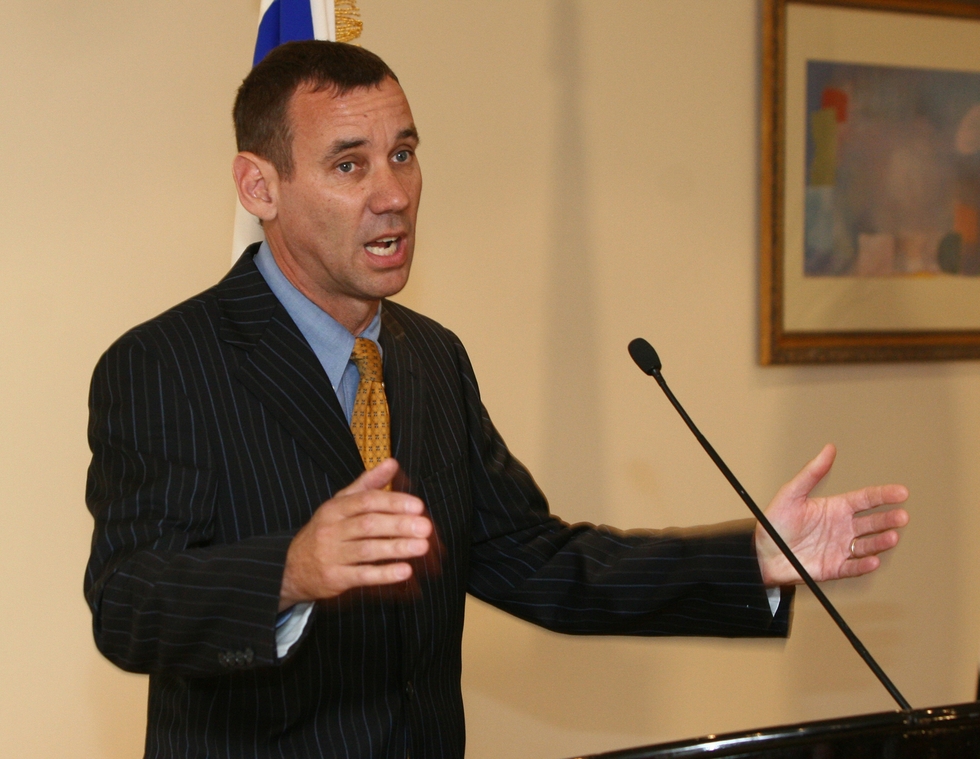Mark Regev tapped to become Israel’s UK ambassador

Few people are as closely identified with Israeli policies as Benjamin Netanyahu’s English-language spokesman Mark Regev, now tapped to succeed Daniel Taub as Israel’s ambassador to the United Kingdom.
Since his appointment by Ehud Olmert in 2007, Regev has become the most recognised face of Israeli policies, especially Israel’s wars. His transition to one of Israel’s most lucrative diplomatic posts - perhaps third in prestige and importance after the US and the UN - offers some interesting hints about Prime Minister Benjamin Netanyahu’s approach to Israel’s diplomatic efforts among an increasingly disenchanted international community.
Born in Australia in 1960, Regev left to go live in Israel in 1982. He spent his early years on a kibbutz, before joining the diplomatic service in 1990. He rose through the corps via a long chain of diplomatic postings, including in Washington and Beijing, before returning home as the Foreign Ministry spokesman.
In 2007, he was invited to become the English-language spokesman of the then prime minister, the already embattled Ehud Olmert. Regev has repeatedly stated he wanted to be personable and human, rather than conduct a PR operation from beneath the anonymity cloak of an official spokesperson.
Although he holds no political clout, he can boast to be the only Israeli talking head whose performances have gone truly viral, clocking up hundreds of thousands of views on social media.
Less flatteringly, though, what drives much of the view counts - to judge at least from the titles of the videos - is not so much admiration for Regev as schadenfreude derived from watching him battered by one foreign commentator after another (the most popular video, at over 600,000 views, is titled “Jon Snow 'annihilates' Israeli spokesperson Mark Regev”.)
In fairness, Regev is tenacious and articulate, holding his ground in the face of his interviewers’ criticism, exasperation and outrage (as well as, critics would point out, factuality, decency, human empathy and common sense). The trouble is that Regev’s position often requires him to push a line at odds with direct eyewitness accounts; such trying to persuade Channel 4’s Jon Snow that Hamas misled his Gaza correspondent into seeing something with his own two eyes.
Thus, the prevailing atmosphere in his interviews is one of perpetually escalating incredulity; however eloquently Regev might be putting forth the Israeli government’s agenda, his interlocutors rarely seem convinced.
On its own, however, such hardheadedness does not disqualify someone from hold the post of ambassador. Quite the contrary: Regev is perhaps the most vivid embodiment of hasbara, or ”explanation”. In its professional sense, it often gets translated as “public diplomacy”.
On a deeper level, though, it denotes an almost manic Israeli conviction that any issues the international community might have with its half-a-century old occupation of the Palestinian Territories is simply the result of Israel not explaining itself well enough to counter the lamentably telegenic Palestinian victimhood.
As this approach has only limited effect - some policies and action are just too blatantly inexplicable or indefensible, try as you might - the process of explanation becomes a goal at its own right.
Mark Regev may not have convinced a single viewer not already heavily biased towards Israel, but his eloquent tenacity in expressing regret for atrocities that are then callously repeated (to yet more expressions of regret) is, to Israeli policymakers, an asset in its own right.
In fact, Regev’s style - commiseration without responsibility - is now beginning to be seen as the more moderate and pragmatic approach.
'Sorry not sorry'
Younger members of the Israeli right, such as Ayelet Shaked, Tzipi Hotoveli and Danny Danon strike a much more defiant tone, defending, rather than excusing, the IDF’s conduct. Dannon, who was sacked from his position of deputy defence minister for criticising Netanyahu’s “soft” approach to Gaza during last year’s war, was plucked out of his somewhat chucklesome position as Minister of Science, Technology and (emphatically) Space and appointed as the Israel’s new ambassador to the UN.
There are domestic motives to Danon’s appointment, not least Netanyahu’s desire to keep the would-be rebel as far from the Likud central arena as possible. But the contrast between the two new postings - in-your-face Dannon and sorry-not-sorry Regev - reveals something interesting about how Netanyahu sees the outposts these two newly made diplomats will man.
For the UN, fire and brimstone; for the UK (and Europe), speak softly and … try to pretend the big stick you’re carrying is actually a lollypop.
Patience in Europe with Israeli policies is beginning to run noticeably thin, and Netanyahu - or his advisors - appear to recognise that this particular say-it-like-is approach is immediately damaging Israel’s own interest. Hence, the decision to appoint an explainer rather than a defiant warmonger - of all of Israel’s public faces - there are few more suited than Regev to the post.
There are two challenges facing Regev, however. One is that from everything we know about his work so far is that he is a sprint runner, rather than a marathon man. Making progress with EU diplomacy, which moves on Israel as slowly but as implacably as a glacier, will demand much more stamina and consistency than sound bite sparring with an irate interviewer on television; and even if he is personally liked, the most acrobatic rhetoric from Regev is likely to be repeatedly undermined by Israel’s actual policies.
Secondly, European disenchantment with Israeli policies began long before the middle finger replaced the whitewash as the country’s main instrument of diplomacy.
After over a decade of use, even the most compelling excuses are beginning to wear thin: you can only claim so many times that your pilots possess pinpoint accuracy and deeply regret hurting innocent civilians, before your listeners beginning to suspect that either the pilots are the worst shots in the Middle East, or that they don’t actually give a damn.
Similarly, Israel’s ongoing occupation and de-facto repudiation of a viable Palestinian state is diametrically opposed to the policies of both the UK and the EU on the same issues, and it seems there the desire in Westminster and Brussels to pretend otherwise is dwindling from one war to the next. Merely repeating that the two policies are not in contradiction is not likely to stay that trend for long.
It is hard to see Regev achieve any more concrete success as an ambassador than he did as a spokesperson.
- Dimi Reider is an Israeli journalist, blogger and co-founder of +972 Magazine. His work has appeared in The New York Review of Books, The New York Times, The Guardian, Foreign Policy, Haaretz, Daily Beast, Al Jazeera and the Jerusalem Post. Dimi is also an Associate Policy Fellow at the European Council on Foreign Relations (ECFR).
The views expressed in this article belong to the author and do not necessarily reflect the editorial policy of Middle East Eye.
Photo: Mark Regev is seen as the face of Israel's policies
New MEE newsletter: Jerusalem Dispatch
Sign up to get the latest insights and analysis on Israel-Palestine, alongside Turkey Unpacked and other MEE newsletters
Middle East Eye delivers independent and unrivalled coverage and analysis of the Middle East, North Africa and beyond. To learn more about republishing this content and the associated fees, please fill out this form. More about MEE can be found here.





